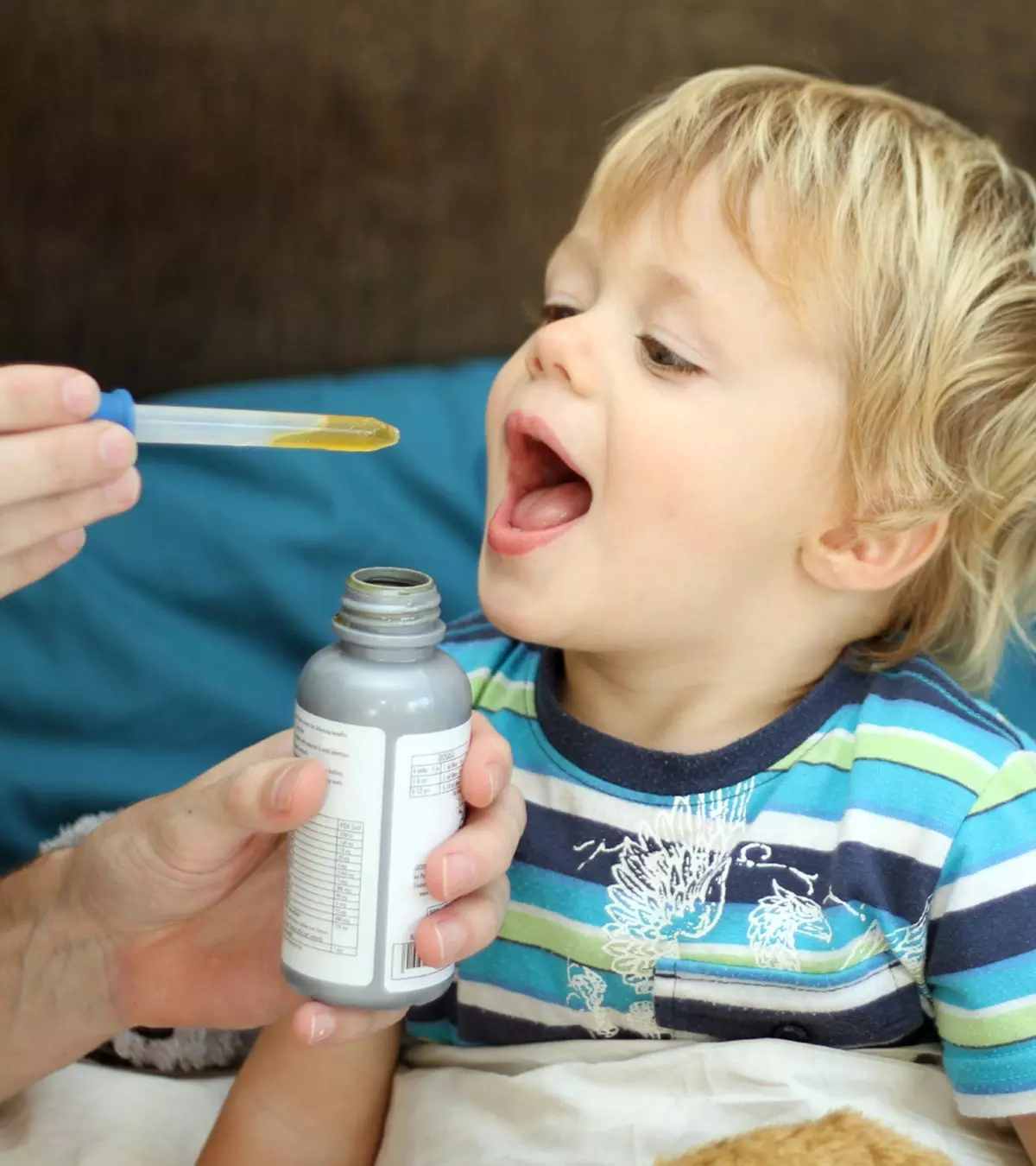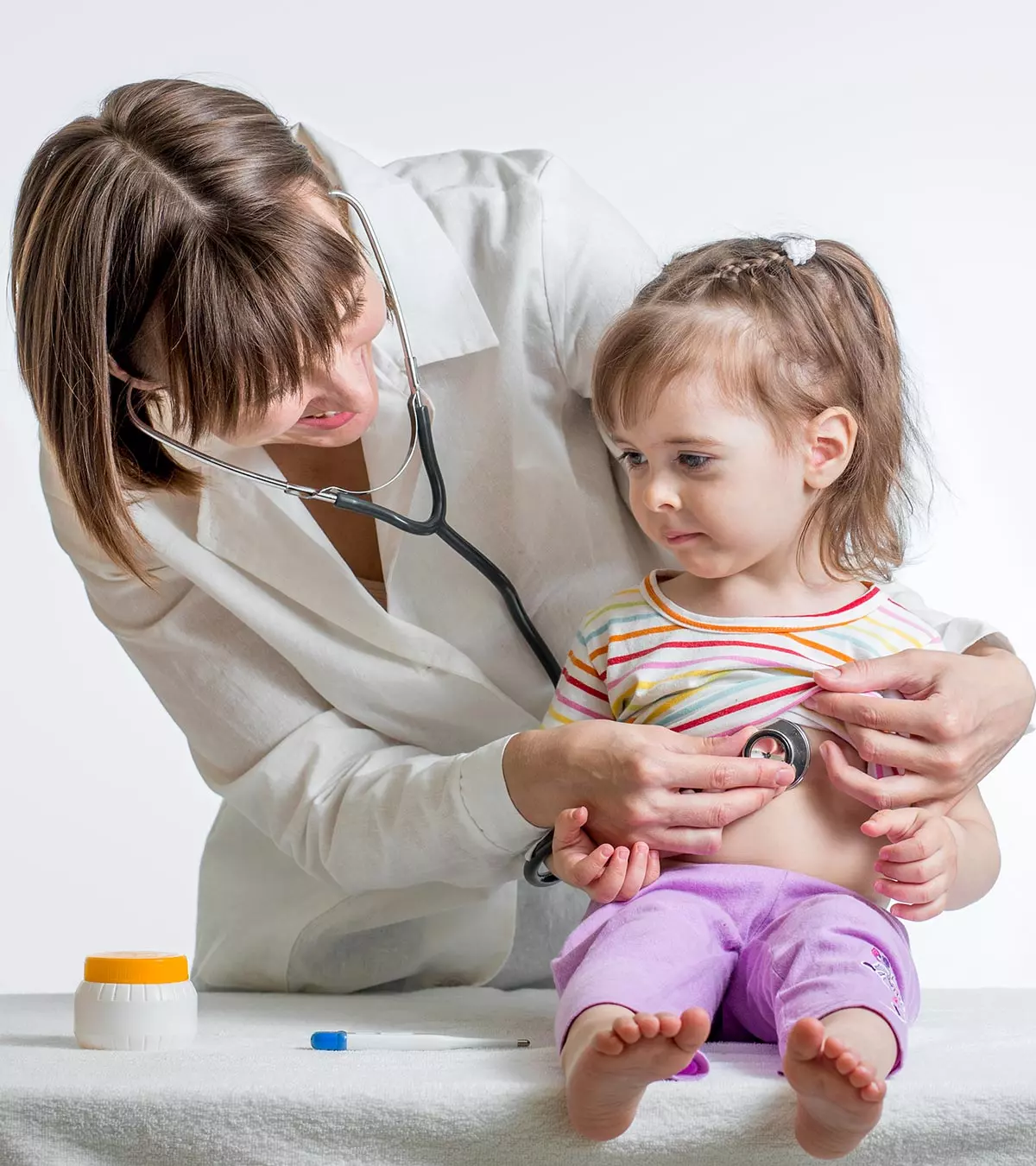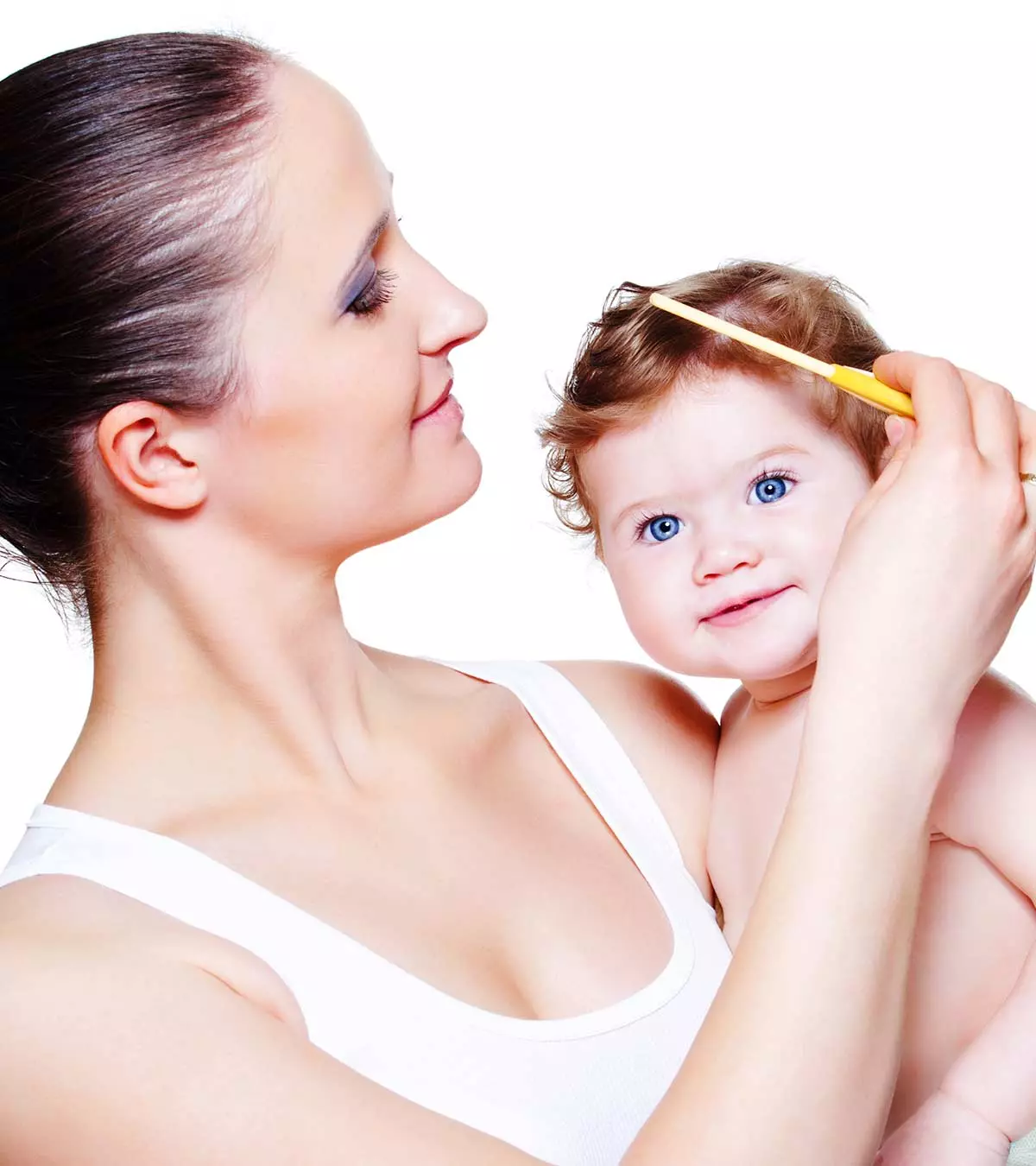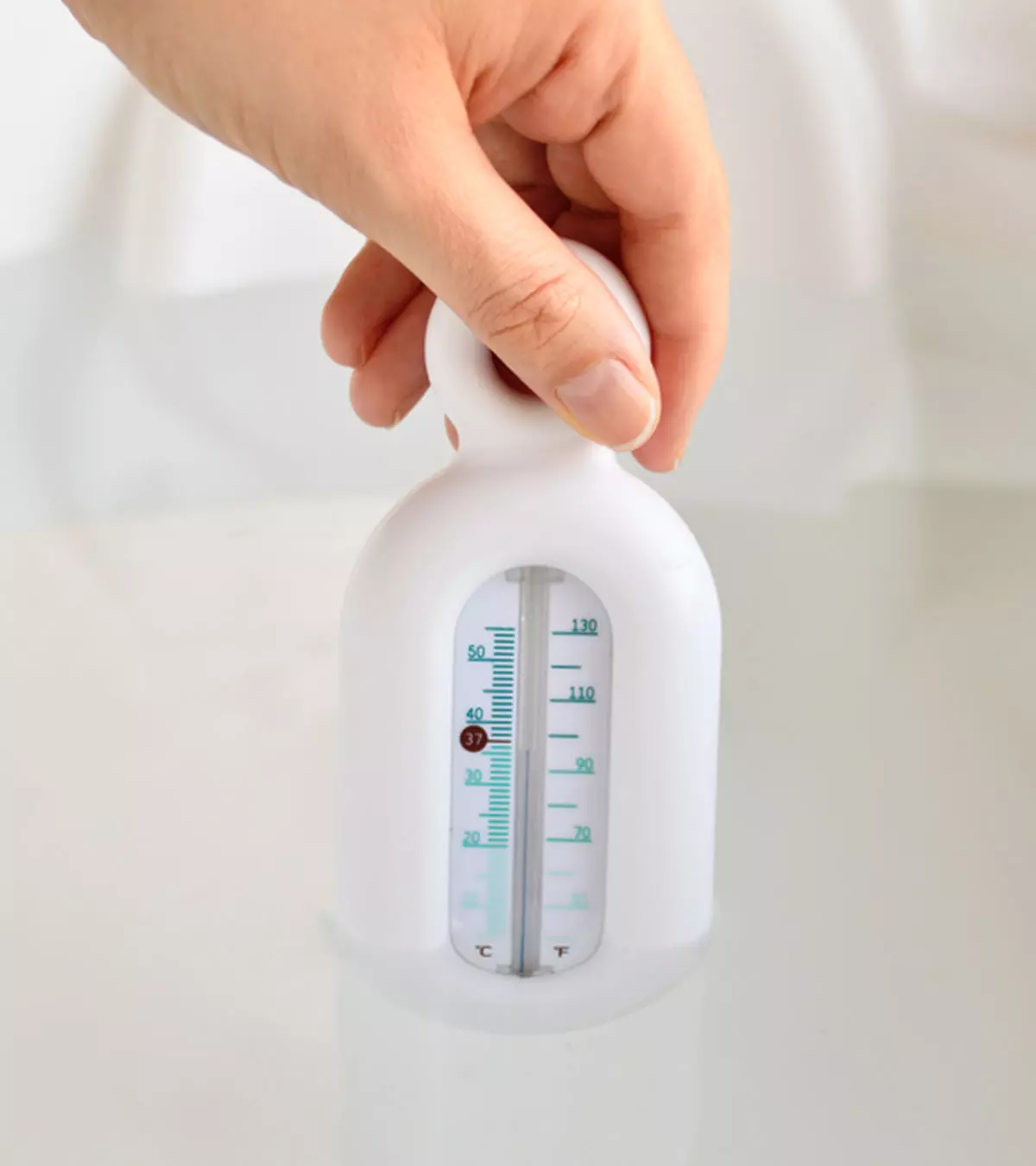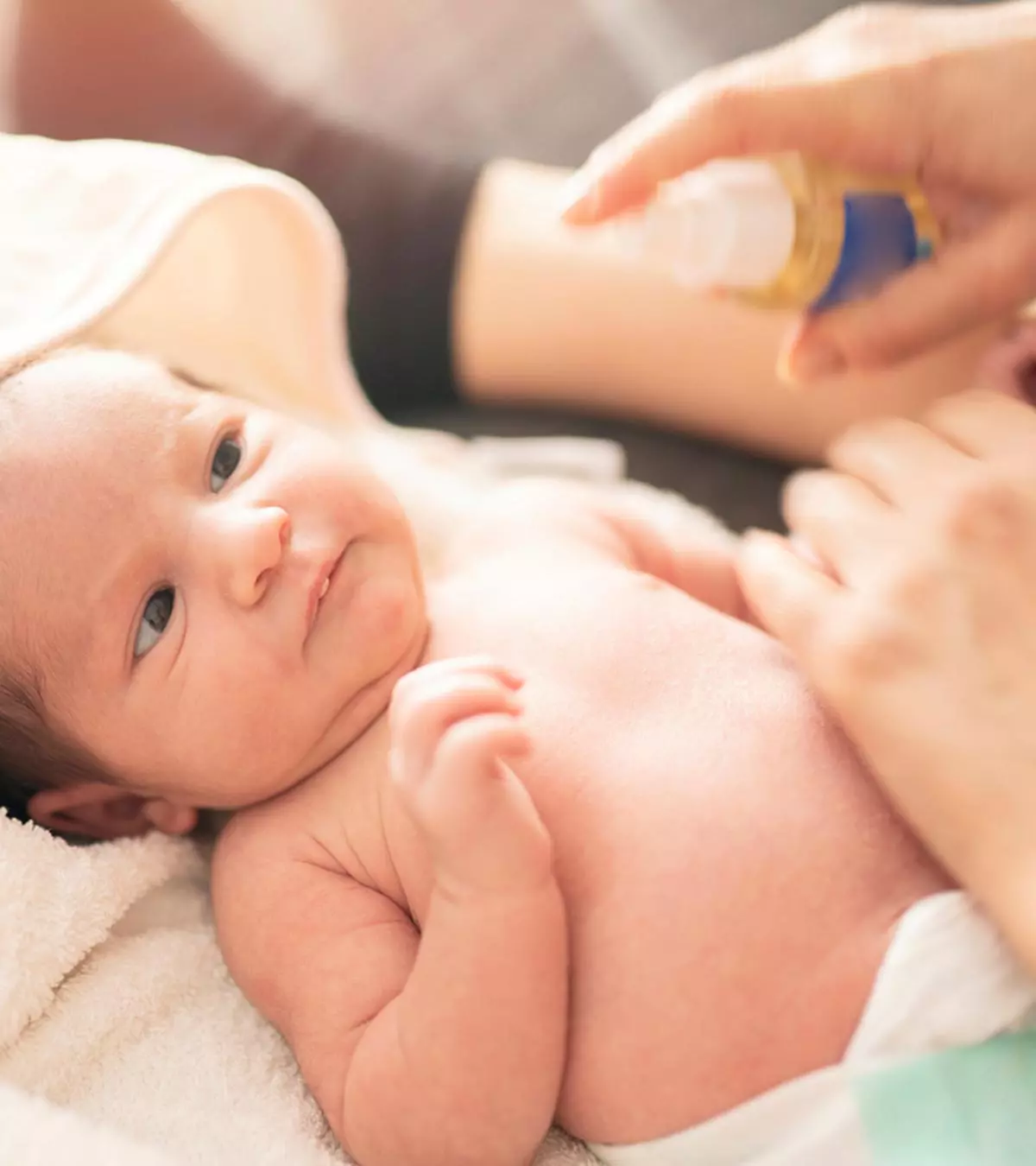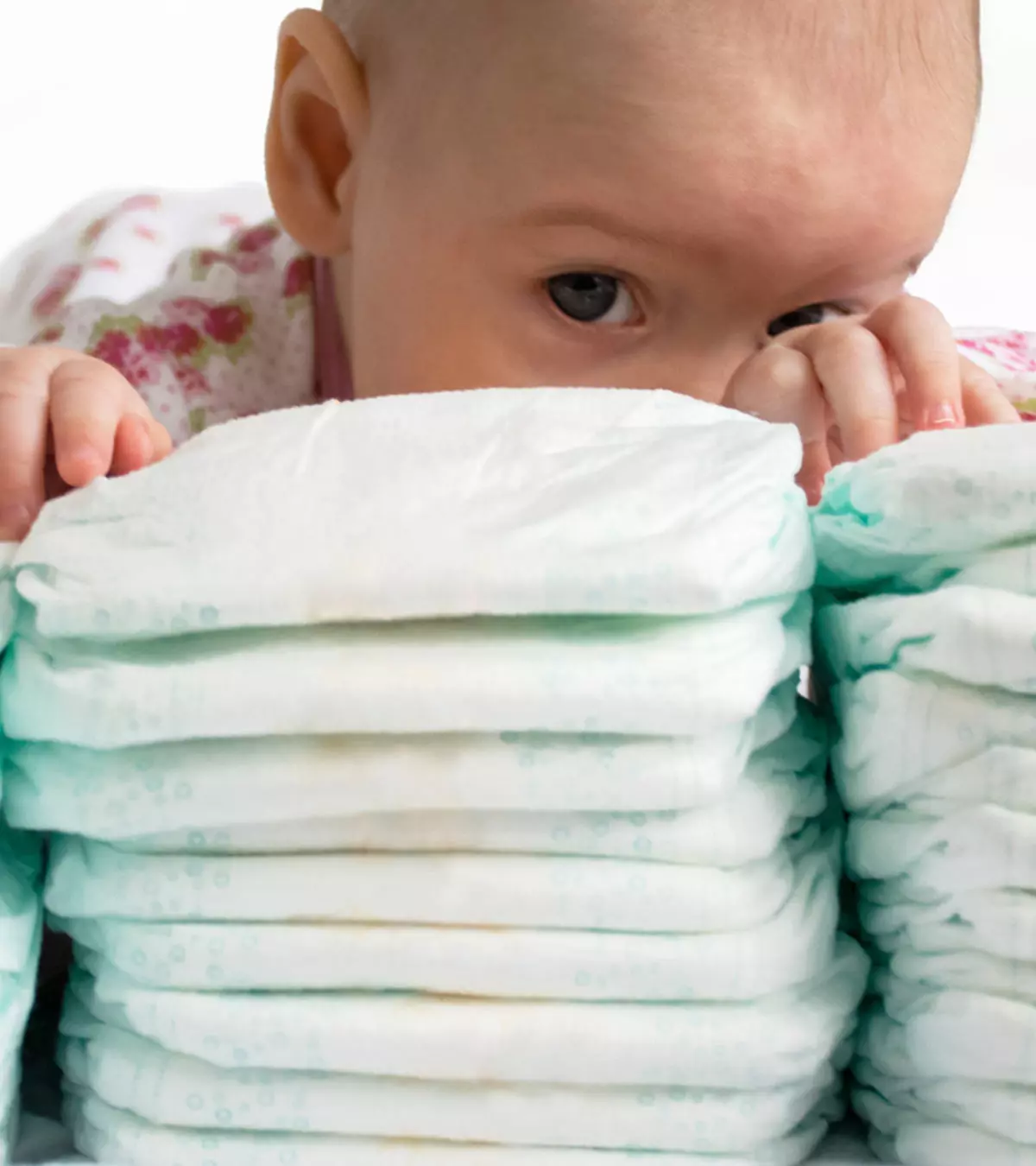
Image: Shutterstock
Since most bacterial activity occurs in the mouth, nose, or teeth, bad breath is prevalent in all ages (1). It’s a popular terminology for halitosis, an oral health problem. Bad breath in toddlers can be caused by various factors, which may signal an underlying medical issue or poor oral hygiene.

Read on to learn about the causes of bad breath in toddlers, its home remedies, and answers to some of the most frequently asked questions.
Key Pointers
- Dry mouth, poor dental hygiene, pungent foods, ill health, and medications can cause bad breath.
- Thumb-sucking, stuffed mouth, post nasal drip, congestion, and respiratory viruses may contribute to bad breath.
- Brushing teeth, cleaning the tongue, staying hydrated, flossing, changing toothbrushes, and sterilizing pacifiers can help with a baby’s bad breath.
- If bad breath or halitosis persists, it’s best to consult a doctor to determine the underlying cause.
Regular dental checkups can help maintain clean and healthy teeth.
8 Causes Of Bad Breath In Toddlers
Bad breath could be a common problem even in healthy toddlers. If your toddler is suffering from bad breath or halitosis, you will have to figure out the reason first. Here are a few common causes (1) (2):
1. Dry mouth
A dry mouth which can be caused from dehydration, medications, or underlying conditions, could lead to bad breath in kids. If your little one is breathing through the mouth because of a stuffy nose, then it is likely to disturb the mouth bacteria and cause bad breath. This promotes oral anaerobic bacterial growth, excessive mucus in the throat, lack of oxygen and saliva. All these conditions lead to the excretion of foul-smelling compounds called volatile sulfur compounds or VSCs from the bacteria.
Other toddler habits like thumb-sucking or stuffing the mouth with a blanket may also leave the little one’s mouth dry, promoting bacterial growth.
2. Poor oral hygiene and dental care
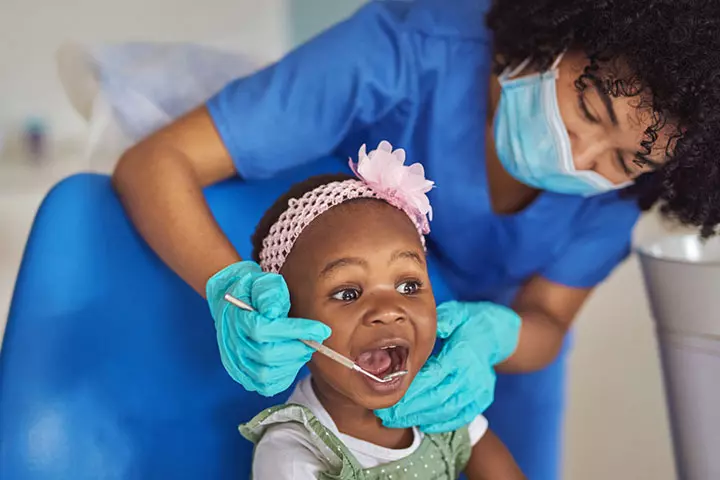
Poor hygiene and food leftovers in the mouth for a long time may lead to bad breath. The mouth bacteria react with the food particles stuck in between the teeth, left on the back of the tongue, or on the surface of the tonsils.
3. An object in the nose
Toddlers may place tiny food particles such as a bean, pea, or a toy in the nostril. A nasal congestion can make them breathe through the mouth and have bad breath.
4. Poor dental care
Poor dental care like a dental abscess, tartar buildup, or cavities can cause bad breath.
5. Pungent foods
Eating pungent foods like onions, garlic, or cheese, may cause temporary bad breath from acid reflux.
6. Ill health

A toddler suffering from illnesses such as tonsillitis, sinus, gastroesophageal reflux (GERDiGastroesophageal reflux- A condition where the reflux of stomach contents to the food pipe causes burning and discomfort in the chest ), or seasonal allergies may experience bad breath. Conditions like gingivitisiInflammation, bleeding, and redness in the gums, usually caused due to poor oral hygiene , thrushiA fungal infection of the oral cavity that causes painful lesions, leading to eating and swallowing difficulties in toddlers (infants and children), and acute sinusitisiShort-term inflammation in the sinuses typically caused due to allergies or infection in toddlers can cause a white tongue and bad breath. Gingivostomatitis is another condition where the toddler has a sore mouth, red gums, and bad breath.
Although rare, infections caused by helicobacter pyloriiA pathogenic bacteria that causes chronic inflammation and ulceration in the stomach and small intestine could also cause bad breath (3).
7. Medications
At times, medicines can cause smelly breath in toddlers. The process of the breakdown of chemicals in medicines can lead to bad breath.
Having bad breath through the day could be due to any of the above reasons. Bad breath after sleep is a common phenomenon. It happens as saliva works actively when the toddlers are awake, keeping the mouth clean and fresh. But, while sleeping, the saliva is not produced, and the mouth muscles stop working. The bacteria start building up, leading to a bad smell.
8. Tongue coating
If you notice a thick white coating or a film on part or the entire upper surface of your toddler’s tongue, it might be white tongue. A white film may form when germs and food particles become stuck between the little bumps on the tongue’s surface, known as papillae. The elevated structure of papillae creates a large surface area for debris accumulation within the mouth, which might result in swelling and inflammation of the papillae. This accumulation is frequently related to foul breath and may leave an unpleasant taste in the mouth (6).
Note: Toddlers are more prone to bad breath if they go to daycare, as they get in contact with other tots carrying respiratory viruses. These viruses cause post nasal dripiA condition marked by the accumulation of excess mucus, which frequently drains through the throat , congestion, and sore throats.
 Did you know?
Did you know?Home Remedies To Get Rid Of Bad Breath In Toddlers
Oral health is key. The best thing to do is to generate more saliva and reduce bacterial growth. Take the following steps to deal with bad breath in your toddler (1):
- Teach your tot to brush their teeth well to fight bacteria. Show the correct way to brush teeth, focusing on using gentle motions with a soft-bristled toothbrush. Encourage brushing for at least two minutes, twice daily. Additionally, brushing after every meal would remove the food stuck in the teeth, preventing decay.

- Keep your toddler’s tongue clean using soft tongue scrapers.
- Get your toddler to drink more water. It helps in enhancing the production of saliva.
- Use a non-abrasive toothpasteiA toothpaste low in abrasives (materials added to a toothpaste to polish or cleanse teeth) to prevent tooth decay. Use an American Dental Association-accepted fluoride toothpaste.
- Floss your little one’s teeth every day to remove the odor-causing food particles from the teeth.
- To effectively clean the debris and plaques, use a new toothbrush every three months.
- Frequently wash the toddler’s hands using soap.
- If your toddler is habituated to sucking fingers, wash the toys and other objects often.
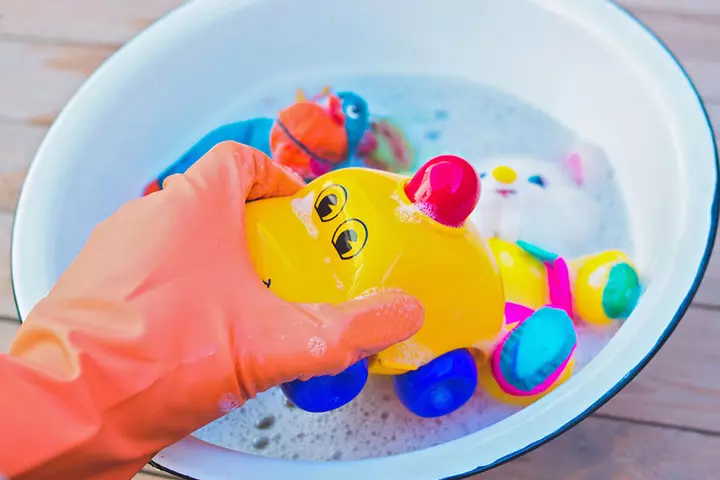
- Sterilize their pacifier, if your toddler still uses one.
- Visit a dentist from as soon as your toddler reaches 12 months of age. Regular dental checkups could help prevent bad breath related to oral hygiene.
Do not use mouthwash for your toddler. It could be difficult for your child to spit and swish. Moreover, mouthwashes only cover the underlying problem. Many types of mouthwash use alcohol, which is just a masking agent. They only worsen bad breath by promoting dry mouth conditions. However, you could check with your dentist if there are any medicinal mouthwashes that could be used for toddlers.
 Quick fact
Quick factWhen To See A Doctor?
You should regularly take your little one for dental checkups to maintain clean and healthy teeth (4). If your child has a persistent bad breath, consult the dentist without any delay. Good oral and dental care should ideally end the problem of bad breath.
If the halitosis in toddlers lasts even after the mouth is determined healthy, you may have to go for additional tests to diagnose the underlying cause. Toddlers might suffer from bad breath problems not only due to bad oral care but also because of some diseases. If you can sense an unusual or harsh odor, visit the doctor immediately.
A flu virus or throat infection in toddlers can cause a fever, loss of appetite, and bad breath. Once the underlying cause of the fever is gone, the bad breath disappears.
Thus, good oral and dental care would help to keep bad breath in toddlers at bay. Also, teaching good dental care habits at an early age will have a long-lasting impact. It requires a lot of patience to deal with bad breath in toddlers. Just do not make your little one too conscious about this!
With so many things that we have told here, you might just have a few questions in mind! Read our FAQ section below to find some quick answers.
Frequently Asked Questions
1. Which diseases cause unusual odor from a toddler’s mouth?
If your toddler has bad breath in spite of good oral health, they might need medical investigations for medical conditions, such as respiratory infections, diabetes, kidney and liver disease, and digestive issues. Also, some other medical conditions such as cat’s cry syndromeiA rare genetic disorder caused due to a deletion in the 5th chromosome characterized by a cat-like cry in infants and sweaty feet syndrome could also lead to bad breath.
2. Why do chronic sinus infection and tonsils cause bad breath?
Experts categorize chronic sinus infections as one of the most hidden yet common causes of bad breath. Signs of sinus infection are cold, yellow discharge from the nose, exhaustion, cough, etc.
Due to the condition, fluid collects in the nasal passages and sinuses. It drips down into the throat and settles on the back of the tongue. Thus, the resident bacteria of the mouth react with the settled mucus drainage and emit foul odors.
3. What foods should I avoid to help my toddler with bad breath?
Avoiding foods such as garlic and onions that can cause bad breath can help your toddler. In addition, taking dietary measures such as not giving sugary foods or drinks under the age of one, avoiding gummy snacks, limiting starchy foods, and avoiding putting the baby to bed with a bottle can help reduce bad breath caused by oral and dental issues (7) (8).
4. What are the signs of bad breath in toddlers?
The signs of bad breath in toddlers include an unpleasant taste in the mouth, foul odor, dry mouth, white tongue surface, and dental bleeding while brushing and flossing. These may also indicate an oral issue, with bad breath being one of its symptoms (1).
If the tonsils are large in your toddler, the nasal secretions, and even food gets deposited in the deep pits of the tonsils. These collections tend to decompose and emit odors (5).
Oral hygiene is important at any age, be it a toddler or grown-up. For toddlers, bad breath could sometimes be due to poor oral hygiene and other benign conditions like pungent food. But at times, it is possible that the reason for bad breath is medical.
If your child has bad breath, do not be alarmed as it is a common and not a concerning condition. Since bad breath in toddlers can be mostly due to poor oral hygiene, maintaining a regular dental routine may help prevent its occurrence. However, do not dismiss bad breath in toddlers as a mere lack of hygiene, as sometimes it may indicate an underlying issue such as thrush, tonsillitis, and GERD. So it is better to consult your child’s pediatrician to rule out any such causes and proceed with appropriate management.
Infographic: Problems Toddlers Might Face Due To Bad Breath
Bad breath in toddlers could be a symptom of an underlying condition. These problems, if left untreated, may lead to long-term issues and other related complications. Read this infographic, which acquaints you with such conditions so that you may consult a doctor soon. Illustration: Momjunction Design Team
Illustration: Common Causes Of Toddler&039s Bad Breath And Home Remedies
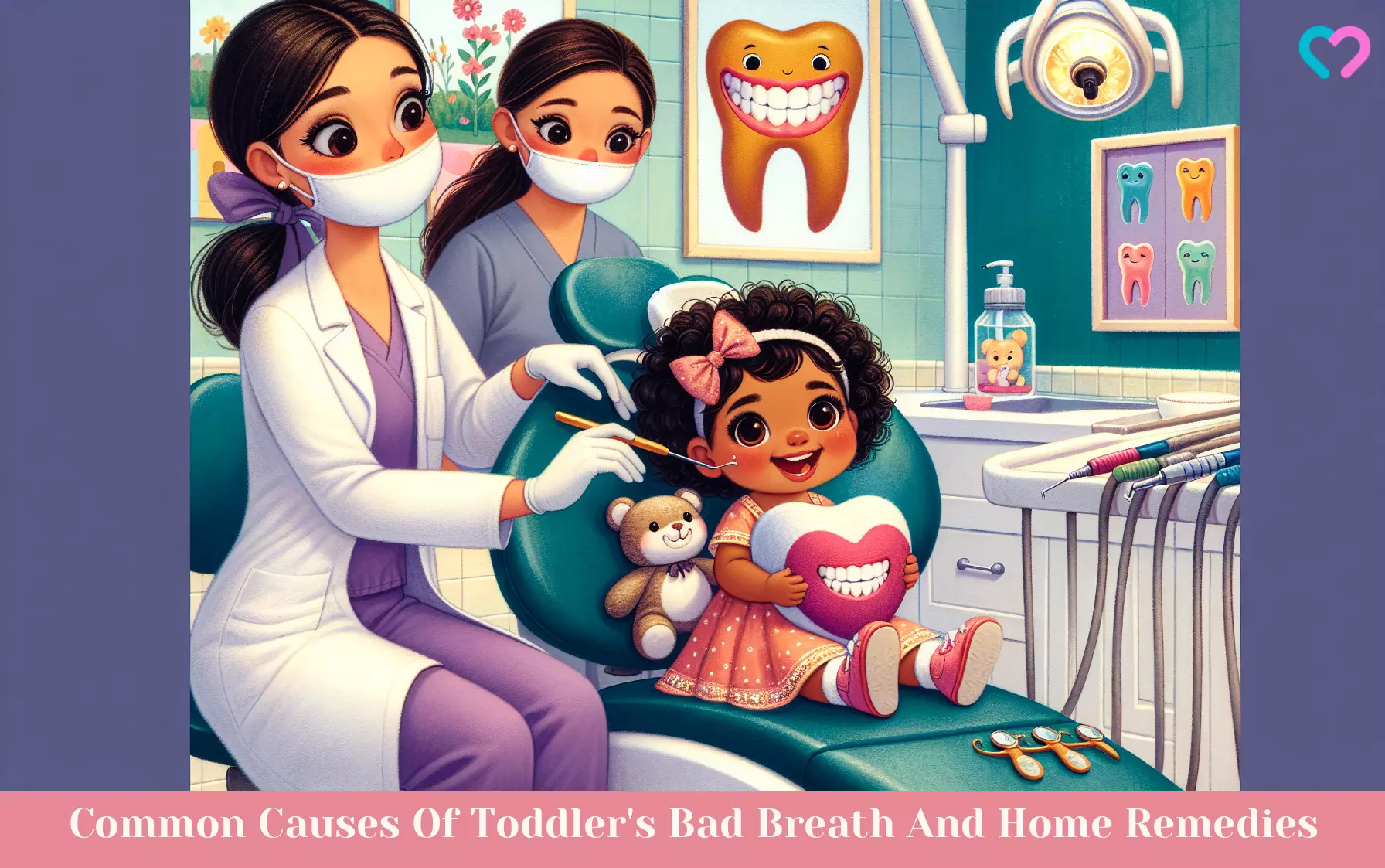
Image: Stable Diffusion/MomJunction Design Team
Discover and learn about the primary culprits that contribute to bad breath in babies and children. Learn how to identify and treat these causes of bad breath in your little ones.
References
1. Mohammad Karimi; The Causes of Halitosis in Children; Neonatal And Pediatric Medicine
2. Bad breath; raising Children, Australia
3. Yilmaz AE et al.; Paediatric Halitosis and Helicobacter pylori Infection.; National Center For Biotechnology Information (2012)
4. Bad breath; National Health Service, UK
5. Tonsil Stones; Cleveland Clinic
6. White Tongue; Cleveland Clinic
7. What causes bad breath?;; Nemours
8. Dental: Teeth and Gum Care for Infants and Toddlers(Open Access Research Article); Nationwide Children’s Hospital
Community Experiences
Join the conversation and become a part of our nurturing community! Share your stories, experiences, and insights to connect with fellow parents.
Read full bio of Dr. Shailesh Shenoy
Read full bio of Dr. Ritika Shah
Read full bio of Swati Patwal
Read full bio of Vidya Tadapatri





